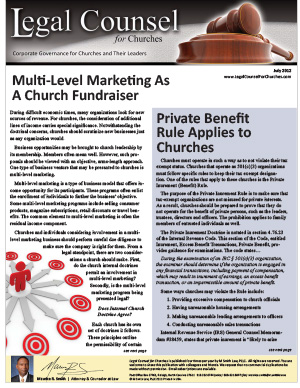Churches must operate in such a way as to not violate their tax exempt status. Churches that operate as 501(c)(3) organizations must follow specific rules to keep their tax exempt designation. One of the rules that apply to these churches is the Private Inurement (Benefit) Rule.
The purpose of the Private Inurement Rule is to make sure that tax-exempt organizations are not misused for private interests. As a result, churches should be prepared to prove that they do not operate for the benefit of private persons, such as the leaders, trustees, directors and officers. The prohibition applies to family members of entrusted individuals as well.
The Private Inurement Doctrine is notated in section 4.76.23 of the Internal Revenue Code. This section of the Code, entitled Inurement, Excess Benefit Transactions, Private Benefit, pro- vides guidance for examinations. The code states…
During the examination of an IRC § 501(c)(3) organization, the examiner should determine if the organization is engaged in any financial transactions, including payment of compensation, which may result in inurement of earnings, an excess benefit transaction, or an impermissible amount of private benefit.
Some ways churches may violate the Rule include:
- Providing excessive compensation to church officials
- Having unreasonable housing arrangements
- Making unreasonable lending arrangements to officers
- Conducting unreasonable sales transactions
Internal Revenue Service (IRS) General Counsel Memorandum #38459, states that private inurement is “likely to arise where the financial benefit represents a transfer of the organization’s financial resources to an individual solely by virtue of the individual’s relationship with the organization, and without regard to accomplishing exempt purposes.”
Courts look at the specific situation to determine if the Rule has been violated. First, the law looks at the purpose of the church. If its basic purpose is to benefit a population of persons without regard to private interests, there is a strong argument to retain the tax exempt status. If it is shown that there is no exempt purpose being pursued, then the church cannot be tax-exempt, regardless of exempt activities that may be performed. Incidental benefits to private individuals will not defeat the exemption.
The Rule applies a reasonableness standard test to transactions under scrutiny. The reasonableness standard relies on comparing the activities to similar organizations. Courts will look to see if the transaction was negotiated on an arm’s-length basis. The potential cost for violating the Private Inurement Rule is the revocation of the church’s tax-exempt status.
To protect your church from a Private Inurement Rule violation, follow good corporate governance in all decisions. Be sure all conveyances of benefits, including compensation, are reasonable. Avoid conflicts of interests. When in doubt, consult your attorney to make sure major transactions are properly conducted.

